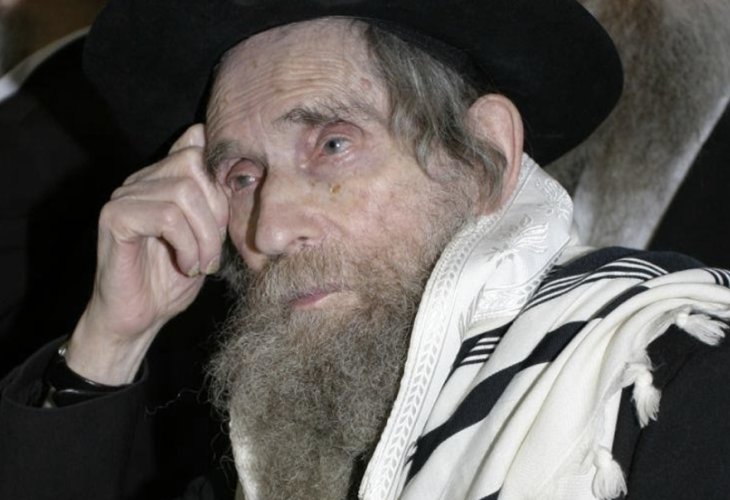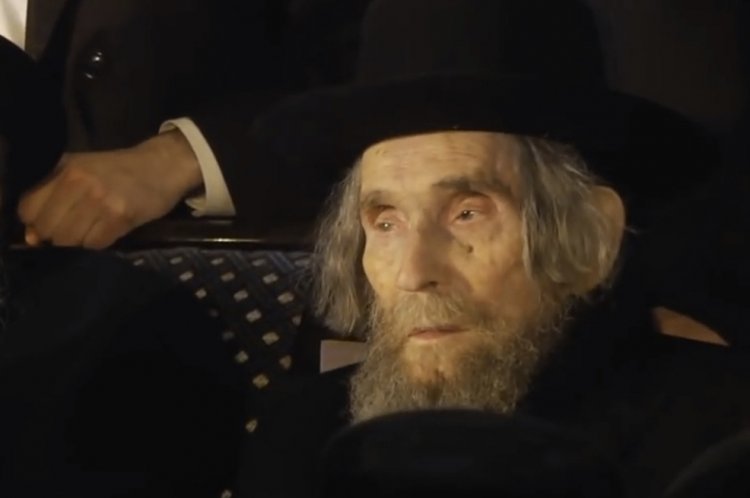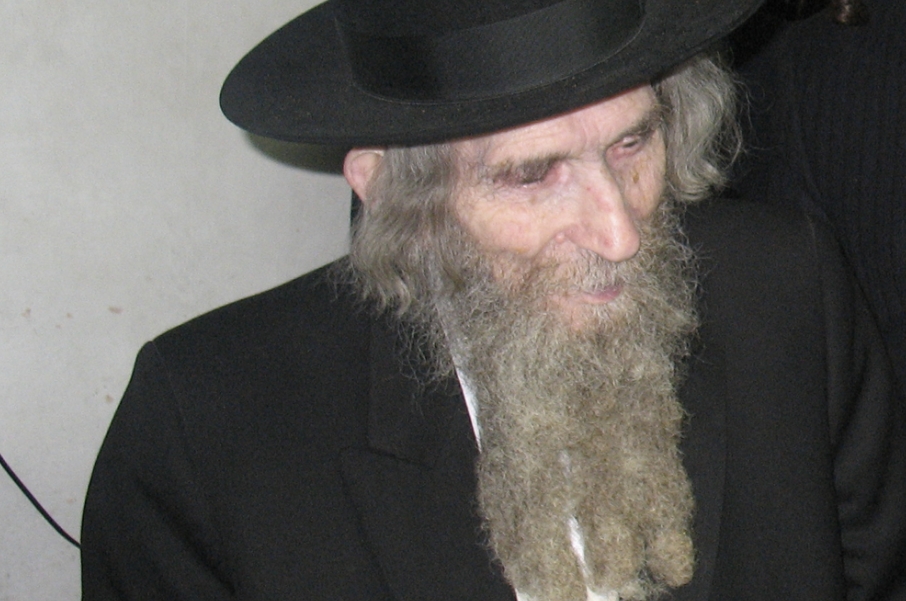Torah Personalities
Lessons from a Respected Leader: Rabbi Aharon Yehuda Leib Shteinman
Why do we mourn the passing of a great leader so deeply? Discover 5 lessons we can learn from the life of Rabbi Shteinman.
 Rabbi Shteinman
Rabbi ShteinmanNathaniel asks, "I attended Rabbi Shteinman's funeral and was amazed by the massive turnout—reports say over half a million people! Unfortunately, I never got to know him personally. I understand he was 104 at his passing, yet people mourned him like a young man. Can you explain this incredible phenomenon?"
* * *
Hello Nathaniel, and thank you for your question.
The Jewish people have a unique mission to repair the world, achieved when all beings recognize their Creator and accept His sovereignty. As in the days of King Solomon, and even more so with the coming redemption, may it happen soon with Hashem's help, the Creator will dwell among us, bringing all his blessings. However, as significant as the mission is, so are the challenges that test us, the Jews. If we persist in overcoming them, we will elevate ourselves and the world.
Each generation faces its own unique difficulties, needing to hold onto the light of faith amidst new challenges, especially in these times. Proper Torah leadership is required to guide the community wisely against those trying to undermine it. Leaders must be sensitive to the unique needs of their generation while adhering to the traditions of our ancestors. Even a small deviation on a fast road could end disastrously for future generations. Only those who have drawn their wisdom from past Torah giants, dedicating themselves purely to Torah study and developing good character traits, are fit to lead the community properly.
The great loss of our leader, Rabbi Aharon Yehuda Leib Shteinman, known to us as "Rosh Yeshiva," is deeply painful. He was one of those rare individuals who set the direction for the entire public against its detractors, making his absence felt by the entire generation. The Rosh Yeshiva was a sage of previous generations, holding onto the torch of Torah tradition passed down to him by mentors like the Chazon Ish. After losing Rabbi Elyashiv and Rabbi Ovadia Yosef, we feel orphaned without the guides who directed us towards the light of Torah (besides the personal void felt by every Torah scholar for his teachings that boosted faith among all Israel).
To appreciate what we've lost, we first need to recognize the importance of Torah scholars. The Torah itself obligates us to follow the path set by our Rabbis: "According to the Torah they teach you, and the judgment they say, you shall follow without deviating right or left." (Deuteronomy 17:11)
Torah sages guide us on how to observe Torah and mitzvot in every generation, set rules and laws, show us where to be stringent and where lenient, and serve as personal role models for us and our children. They connect us faithfully to previous generations, back to Moses: "Remember the days of old, consider the years of many generations. Ask your father and he will tell you, your elders, and they will explain to you!" (Deuteronomy 32:7)
By the Torah's merit, as known, the entire world exists, as the prophet says: "So said Hashem, if my covenant of day and night were not, the ordinances of heaven and earth, I would not have established." (Jeremiah 33:25) Torah scholars labor over Torah day and night, achieving deep wisdom and reinforcing the covenant in every Jew's heart. They are the heart, uniting the body and infusing it with life. Without them, Israel might lose its grasp on its Torah. But just as their righteousness and immense wisdom sustain the world, the Torah attests that Hashem sustains an entire community because of ten righteous people each generation (Genesis 18:32).
This means that the great scholars of Israel, even when studying in their rooms, support the entire generation through their pure Torah studies. Hence, our sages severely warned against the mistaken belief that Torah sages are of no benefit to the public, only studying for their own sake: "Who is a heretic? Said Rav Yosef: Such as those who say—What benefit do we have from the rabbis? They study for themselves; for themselves they teach." (Sanhedrin 99b)
Some haven't yet realized the importance of our generation's sages because they live in a generation lacking love for Torah. But when they connect to the holy Torah, their eyes will open to its beauty and they will recognize the importance of every lighthouse guiding us in darkness.
Public mourning for the Torah sages we've lost adds love for the Torah and its great masters in our hearts and offers us a spiritual connection to them.
After this general explanation on the significance of Israel's sages, let's highlight several of Rabbi Shteinman’s notable traits as an example and inspiration—when will my deeds approach those of my teachers.
1. Modesty.
Anyone who visited him learned an important lesson in modesty. Despite his greatness and the impact of his Torah on the entire generation, Rabbi Shteinman lived in a small, simple, modest apartment, his lifestyle didn't change even in his old age. His simple life was a symbol to the entire generation to regard luxurious living as vanity and recognize that Torah is the greatest pleasure aspiring to, as our sages taught: "Eat bread with salt, drink water in a measure, sleep on the earth, live a life of deprivation, and labor in the Torah. If you do so—you are happy and fulfilled." (Avot 6:4)
Although many donors offered to upgrade and renovate the Rabbi's home, he refused. This echoed the teachings of the Chafetz Chaim, who lived in humble surroundings despite visitors critiquing his conditions. When a wealthy visitor expressed surprise at his sparse accommodations, the Chafetz Chaim countered by asking where the wealthy man was staying during his visit. Upon learning that he was in a simple hotel, the Chafetz Chaim likened the man's temporary stay to our time on Earth, borrowed to gather Torah and mitzvot: "This world is like a corridor before the world to come. Prepare yourself in the corridor to enter the banquet hall." (Avot 4:16)
While some great rabbis lived in sizable homes, they did not notice their surroundings, engrossed in holy Torah. The public often does not recognize this. The Rosh Yeshiva's lifestyle was an outward display of profound modesty and humility in all his ways. He did not seek glory or honor, only Torah. His modesty was a stark contrast to his importance and taught us all about humility and modesty in a great person.
2. Humility.
The Rosh Yeshiva studied Torah privately, escaping arrogance and praise, he did not seek leadership. Some pursue honor in life, and some in death—through the works they leave behind and the praises said about them. But the Rosh Yeshiva saw only Torah and the Jewish people, not himself. Even more than his modest life, his testament speaks volumes: "I strongly ask that there be no eulogy, either in my presence or elsewhere. No memorial or mourning rally... Do not write any articles about me in daily, weekly, or monthly newspapers. Do not print advertisements about the funeral, or announce it over microphones or radio... Do not write any titles on my gravestone... I request that my name not be mentioned with words like 'righteous' or 'God-fearing' to avoid embarrassment in the World of Truth."

3. Personal and Unique Love for Every Jew.
The Rosh Yeshiva opened his door to all who sought him and personally responded to those seeking his advice. Daily, dozens, and sometimes hundreds, of Jews came for counsel and blessings, their diversity testified to his love for all Jews—Lithuanians, Sephardic, Hasidic, returnees to the faith, observant and traditional Jews all came. Rabbi Shteinman taught Torah to anyone who desired it. Video clips show him examining children and young yeshiva students, fostering their love for Torah. In the morning, he might meet the British ambassador (a real case), in the evening bless an unknown student seeking his guidance. His influence spanned distances, impacting thousands, yet each encounter felt personal, connecting him to every Jew seeking guidance.
In a memorable video, when asked if a widow’s son should be expelled from his school due to a staff member's "feeling" he wasn't a cultural fit, the Rabbi saw the core issue and cried out, "Pride, pride! Someone always objects due to ego—not fear of Heaven—but pride," and demanded the child stay.
I can share personally how, as an 18-year-old returnee attending yeshiva, I wanted to continue outreach work. My teachers sought Rabbi Shteinman's decision. I was very emotional—my outreach efforts could end that day. After listening and consulting with three of my yeshiva teachers about me, Rabbi Shteinman asked to see me personally. He looked at me for a long moment, smiled, and said, "Hashem gave you this desire because He wants you to engage in it. We need people like you in our generation," and blessed me. My outreach continued thanks to him, and I acted with his authority to this day, fulfilling my duty faithfully, b'ezrat Hashem. This was an example of the Rabbi's personal attention, changing a person's life course even in lesser-known cases. No doubt, many better than I were quietly guided and blessed by Rabbi Shteinman, achieving great deeds for Israel thanks to him. We see the outcomes of outreach and kindness but not the gears turning behind them.

4. Devotion to Truth and Carefulness.
The Rabbi was meticulous in speech, careful not to declare permissible what is forbidden or vice versa. He perceived the need behind questions, investigating thoroughly to provide the most accurate response.
Illustrations are countless, but let me share a personal instance I witnessed. Once, when seeking advice on lecture guidance, I first asked if he remembered me, to which he admitted he did not. Though disappointed, I greatly admired his honesty. When I reminded him who I was and asked if teaching before a separated male and female audience in a yeshiva was permissible, he cautiously replied, "Better not." I pressed for clarity if it was allowed, yet he reiterated, "Better not." He wouldn't outright forbid it, and I didn’t understand why.
His caution saved me when a teaching opportunity suddenly saw a mixed audience far from Torah who couldn’t comprehend such segregation. Realizing an outright "no" would result in great offense, his "better not" unexpectedly allowed me a path to proceed without dishonor to Torah or tarnishing the occasion, guiding me prudently.
His careful wording even shines in his testament: "As many misunderstand me, I advise not naming children after me, but I do not prohibit it." Notice, he did not forbid, aware of any misstep on violating his prohibition, diminishing honor while maintaining respect—significant through precise phrasing.
5. Love of Torah.
Rabbi Shteinman had deep understanding and sensitivity to the spirit of his generation, advising the public to act with peace. While some mistook this as compromising on values, it's important to clarify that, like his predecessors, he highlighted the Torah’s significance and opposed enlisting students who wanted to study exclusively. However, he charted a course to achieve goals peaceably, lawfully, not through aggression. In many conventions he attended, he emphasized mainly Torah study and modesty.
His immense love for Torah was exemplified by his ascetic lifestyle, delving into Torah day and night, pouring all his energy into it. This extraordinary affection resonates in his will, where he stated, "If searching for a place to lead services will cause much Torah loss—it's better to study for its own sake at that time!
He never spared honor for himself but never compromised on the Torah's dignity.
In summary, for any who appreciate the Rosh Yeshiva's goodness, remember what he penned in his will: "I request anyone seeking my well-being to learn one Mishnah chapter every day until the twelve-month period ends, and girls will recite ten chapters of Psalms daily, including Shabbat and holidays." In memory of Rabbi Aharon Yehuda Leib son of Naftali Tzvi Shteinman, may his memory be a blessing.
Special thanks to Rabbi Yaakov Moshe Segal for editing the article.
Working with teenagers? Know how to answer with Torah and science. For every question—an answer! Course by Daniel Bels in Bnei Brak. For details: 052-712-5466

